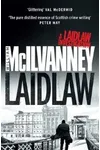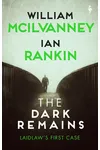Step into the gritty, soul-stirring world of Jack Laidlaw, where Glasgow’s shadowy streets pulse with crime, compassion, and contradiction. This detective series, born from the pen of William McIlvanney and later enriched by Ian Rankin, is the cornerstone of tartan noir—a genre that blends hard-boiled crime with Scottish heart. With its philosophical detective and vivid urban backdrop, Jack Laidlaw invites readers to explore humanity’s darker corners with a knowing wink.
Unlike typical crime novels, this series doesn’t just chase whodunits; it dives deep into the why, unraveling the complexities of a city and its people. Ready to meet the detective who inspired a generation? Let’s walk Glasgow’s mean streets together.
How Jack Laidlaw Began
In 1977, William McIlvanney, already a celebrated literary author with a Whitbread Prize for his novel Docherty, shocked readers by diving into crime fiction with Laidlaw. Inspired by Glasgow’s raw energy and his own roots in working-class Scotland, McIlvanney crafted Detective Inspector Jack Laidlaw—a maverick who keeps Kierkegaard in his desk and whiskey in his veins. His goal? To create a crime novel that was as much about the human condition as it was about catching killers. The result was a groundbreaking trilogy, later expanded by Ian Rankin, who completed McIlvanney’s unfinished prequel after his death in 2015.
The Heart of Jack Laidlaw
The Jack Laidlaw series spans four books, each a gritty love letter to 1970s Glasgow. Laidlaw (1977) introduces Jack, a hard-drinking philosopher-detective, as he hunts a teenager’s murderer through a city rife with violence and bigotry. The Papers of Tony Veitch (1983) follows Laidlaw unraveling a student’s disappearance amid gangland corruption. Strange Loyalties (1991) shifts to a personal quest, with Laidlaw investigating his brother’s suspicious death. The Dark Remains (2021), a prequel co-authored by Rankin, sees a younger Laidlaw tackle a gangland lawyer’s murder.
Themes of morality, justice, and duality run deep. Laidlaw isn’t your typical cop—he’s a cynic with a soft spot for criminals, a family man who sleeps in hotels, and a scholar of existentialism navigating Glasgow’s decay. McIlvanney’s poetic prose and Rankin’s sharp dialogue paint a city of stark contrasts: compassion and cruelty, poverty and power. The series’ tartan noir style—gritty, introspective, and darkly humorous—sets it apart, making Glasgow as much a character as Laidlaw himself.
Why Jack Laidlaw Resonates
Jack Laidlaw didn’t just launch tartan noir; it redefined Scottish crime fiction. McIlvanney’s unflinching look at social issues—class struggles, misogyny, deindustrialization—inspired authors like Val McDermid, Denise Mina, and Ian Rankin, whose Rebus series owes a debt to Laidlaw’s blueprint. Fans cherish the series for its literary depth and authentic Glaswegian voice, with dialogue dripping in local dialect. Its influence endures, with The Dark Remains introducing new readers to Laidlaw’s world and cementing McIlvanney’s legacy as the genre’s godfather.
- Publication Years: 1977–2021
- Books: 4 (Laidlaw, The Papers of Tony Veitch, Strange Loyalties, The Dark Remains)
- Awards: Silver Daggers for Laidlaw and The Papers of Tony Veitch, Glasgow Herald’s People’s Prize for Strange Loyalties
Grab Laidlaw and dive into tartan noir’s beating heart—Jack’s Glasgow awaits, ready to thrill and challenge your perspective!



